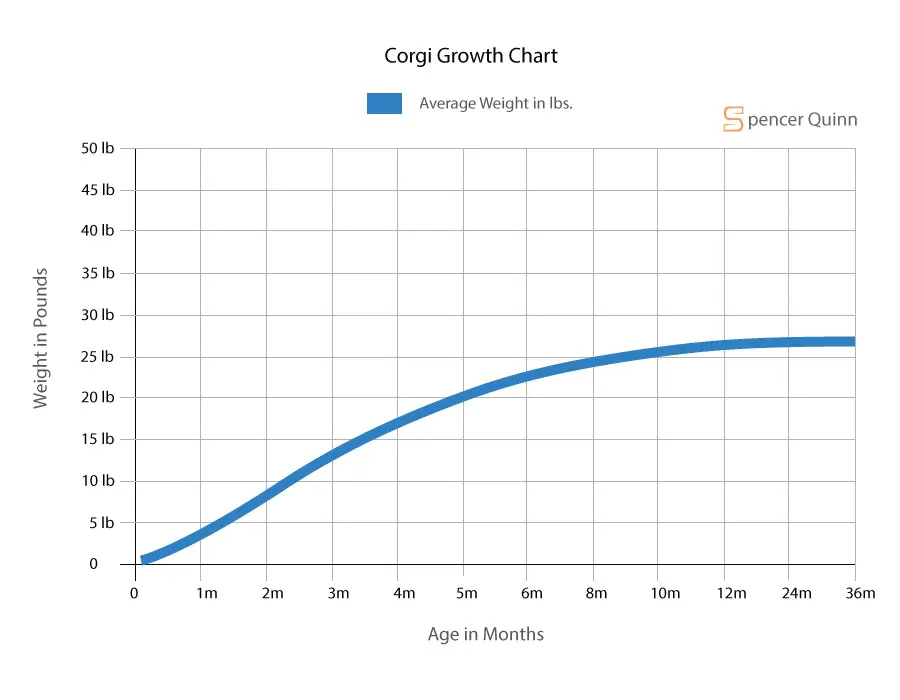How Much to Feed My Corgi

The Corgi is a fun dog to make a companion out of due to its playful, bold, outgoing, and friendly sides. So, how do you feed them properly during their puppyhood? Fortunately, we wrote this article to help you figure out the best nutrition for your Corgi pup.
Feeding the right food to your Corgi puppy is one matter but knowing how much to feed is another. That's why you should know the proper scheduling depending on the Corgi puppy's age, activity levels, health concerns, and the like.
To help you understand the ideal feeding methods for your Corgi puppy, read our article below. We'll also answer a couple of FAQs to aid you in giving the best nutrition to make your Corgi puppy grow strong and healthy into adulthood.
Page Contents
- 1 How much to feed a Corgi puppy?
- 1.1 Birth to 6 weeks old
- 1.2 8 to 10 weeks old
- 1.3 12 weeks to 6 months old
- 1.4 9 months old and above
- 2 Feeding Schedule
- 3 Growth Chart
- 4 Recommended Food
- 4.1 1. High-quality kibble
- 4.2 2. Foods with omega fatty acids
- 4.3 3. Glucosamine-rich foods
- 4.4 4. Fewer fats
- 5 Foods to Avoid
- 6 FAQs on Feeding a Corgi Puppy
- 6.1 When is the best time to switch my Corgi puppy to adult food?
- 6.2 How do I choose the right food for my Corgi puppy?
- 6.2.1 1. Free from artificial flavorings
- 6.2.2 2. No animal by-products
- 6.2.3 3. Small-sized bites
- 6.2.4 4. Important nutrients
- 6.3 Help! My Corgi puppy won't eat! What should I do?
- 6.4 1. Switch your current puppy food brand
- 6.5 2. Combine kibble with wet food
- 6.6 3. Try puzzle or toy feeders
- 6.7 4. Watch for other signs or talk to your vet
- 6.8 My Corgi is always hungry! What should I do?
- 7 Raw feeding a Corgi puppy
- 8 Slow-feeding a Corgi puppy
- 8.1 1. A slow feeder bowl
- 8.2 2. A puzzle feeder
- 8.3 3. A stricter feeding schedule
- 8.4 4. Provide more daily feedings with smaller food amounts
- 9 Conclusion
How much to feed a Corgi puppy?
In general, a Corgi puppy should be fed 2 to 3 times a day with about 1 to 1 1/2 cups of food divided equally.
The Corgi is a small to a medium-sized dog (depending on the type of Corgi) so they will get obese at a much more likely compared to other bigger dogs. It can sometimes be difficult to figure out their proper nutrition and ideal weight, which is why we also included a growth chart below to act as your reference.
With that said, here's what you can expect on feeding your Corgi puppy depending on their age:
Birth to 6 weeks old
At birth, the Corgi puppy should be nursed by their mother and free-feeding is the best option. Weaning can be done at the 6th week or whenever is convenient for your puppy. Always make sure to take it slow so that your pup's digestive system won't be disrupted.
If, for some reason, the Corgi puppy can't be nursed by their mother, provide a milk replacer formula for them until the 8th week.
8 to 10 weeks old
During the 8th week, a Corgi puppy should be fed 3 to 4 times a day with dry kibble (around 0.15 cups). That's because a Corgi puppy comes from a small breed and might not be able to take too much food in one go. Always start slow with small breeds like the Corgi.
On the 10th week of your Corgi puppy, they might have doubled their weight from the previous 2 weeks. You can increase the food intake of your Corgi puppy to 1/4 cup and feed them about 3 times a day.
12 weeks to 6 months old
A Corgi during this time should get about 3/4 cup of food a day and should be fed twice daily. Keep in mind to exercise and play with your Corgi puppy to avoid weight issues. You can increase the Corgi puppy's food to about 0.33 cups a day during the 6th month.
9 months old and above
The Corgi puppy can be fed up to 0.65 cups a day, divided into two meals daily. They are close to adulthood during this stage but don't overdo the food portions so that they won't get overfed.
Feeding Schedule
A recommended feeding schedule for your Corgi puppy can be something like this:
| Age in months | 2 | 3 | 4 | 5 | 6 | 7 | 8 | 9-10 | 11-12 |
| Food per day | 1/3 cup | 2/3 cup | 1 cup | 1 cup | 1 cup | 1 cup | 1 cup | 1 1/2 cups | 1 1/2 cups |
| Meals per day | 4 | 4 | 4 | 3 | 3 | 2 to 3 | 2 to 3 | 1 to 2 | 1 to 2 |
Growth Chart
For you to know the appropriate weight of your Corgi puppy, here's a helpful growth or weight chart:
| Age in months | Weight in lbs | Weight in kg |
|---|---|---|
| 1 month | 4 lbs. | 1.8 kg |
| 2 months | 8 lbs. | 3.6 kg |
| 3 months | 13 lbs. | 5.8 kg |
| 4 months | 17 lbs. | 7.7 kg |
| 5 months | 20 lbs. | 9 kg |
| 6 months | 23 lbs. | 10 kg |
| 8 months | 25 lbs. | 11 kg |
| 10 months | 26 lbs. | 11.5 kg |
| 12 months | 27 lbs. | 12 kg |
| 24 months | 27 lbs. | 12 kg |

Recommended Food
Like most dogs, the Corgi best works with the following foods:
1. High-quality kibble
Look for kibble that's appropriate for a small breed like the Corgi. This means that the pieces of the kibble are small enough for easy digestion since your Corgi's mouth is not that big and their stomach might get upset if the pieces are too overwhelming to digest.
Kibble is usually found in the supermarket but make sure you find kibble with high-quality ingredients, fewer fillers, and are specialized for your puppy's nutrition.
2. Foods with omega fatty acids
The Corgi is a breed that's prone to heart diseases and skin problems. Therefore, it makes sense to find puppy food for them that contains omega fatty acids, such as fish formulas. They will help improve their skin and coat condition, as well as keep them away from heart diseases.
3. Glucosamine-rich foods
Since the Corgi is a breed with naturally short legs, they need all the bone and joint support they can get. Arthritis and hip dysplasia are common problems for most Corgis so during their puppy stage, giving them glucosamine-rich foods is beneficial to their overall health into adulthood.
4. Fewer fats
The Corgi is a small breed that's prone to obesity. Therefore, you should lessen the fat content for them. Stick to our feeding guide above and your Corgi pup will be fine.
Foods to Avoid
A Corgi's diet should be well-balanced and should less likely give them too much weight. Among the foods to avoid for Corgi puppies include dairy food. That's because saturated fats are common in dairy foods, such as cheese. Furthermore, they could also give your Corgi some digestive upset.
Moreover, soy, corn, and wheat are not that ideal for your Corgi puppy because not only does it make their poop smell bad, but they also provide little to no nutritional value for them. Certain cereals and oats are okay because they have healthy nutrients for your puppy's heart. If you're not too sure which grains are advisable for your Corgi pup, talk to your vet about it.
Another ingredient to avoid for your Corgi puppy's food is an animal by-product. They have no specific listing on the label and you won't know if they are chicken bones, chicken feet, and other various parts of the animal. You won't even know what animals those are and where they came from – they could even come from sick animals!
FAQs on Feeding a Corgi Puppy
If you have a couple of questions that you want to know about when feeding your Corgi puppy, we'll answer some of them below:
When is the best time to switch my Corgi puppy to adult food?
The ideal time that you can switch your Corgi puppy's food to adult food is between 12 to 14 months old. By that time, a Corgi has reached adulthood.
As with switching to different brands of food, make sure that the process is gradual. Start by putting a little bit of the new food and then more of the old food. Gradually, increase the amount of the new food after a few days and then have less of the old food. Eventually, your Corgi puppy will feed on the new food just fine.
The importance of gradual switching when it comes to a new food for your Corgi puppy (or any breed of puppy, for that matter) is to avoid digestive upsets and shock. Most puppies get shocked by the new food so they should have gradual transitions when you want to feed them with new food. Most of them would even avoid it because of the taste so having a little gradual training will make it work.
How do I choose the right food for my Corgi puppy?
When choosing the ideal food for your Corgi puppy, you should consider the following:
1. Free from artificial flavorings
While picky eaters quickly feast on flavorful foods, did you know that in the long run, giving them foods with artificial flavorings is bad for them? The first reason is that they contain certain chemicals that aren't helpful for their health.
Second, artificial flavorings make them even more of a picky eater. If your puppy got used to eating different kinds of food while they are still young, they will most likely become picky eaters in the future. Therefore, a balanced and varied diet is important to tweak their taste buds.
2. No animal by-products
These by-products are not healthy because they may contain animal parts that are not supposed to be eaten, such as chicken beaks, ground bones, and the like. They could cause a choking hazard to your puppy.
What's more, animal by-products have no definitive origin so you might get a part of an animal that caught a very serious disease, which could be dangerous to your pet in the long run. A Corgi puppy might get stomach upsets if they aren't fed with quality food.
3. Small-sized bites
This applies well to kibble if you want to buy the best Corgi puppy food. Since they are a small breed, you should give your Corgi puppy just the right size of kibble to avoid digestive upsets and difficulty in eating.
4. Important nutrients
Among the nutrients that will make a Corgi puppy healthy include calcium, phosphorus, magnesium, and vitamin A. Calcium is found in some dairy and veggies, but if your puppy is lactose-intolerant, go for vegetable sources instead. Magnesium, vitamin A, and phosphorus are found similarly in fresh produce.
Help! My Corgi puppy won't eat! What should I do?
If your Corgi pup is a little stiff on their eating habits, you can try any of the following:
1. Switch your current puppy food brand
Sometimes, your Corgi puppy might not be doing well with your current food based on their taste buds. You can slowly change the puppy food by adding the new food a little bit and then gradually transitioning to the new food in full blast.
Switching food brands can also be more than just taste preferences – there will be times that your Corgi puppy might be allergic to something that was in their previous food, hence, they weren't eating it that much.
2. Combine kibble with wet food
Most young puppies who are picky eaters can be served with a mix of wet and dry food. Simply prepare wet or canned food that's flavorful, such as chicken or lamb meal, and then top it off with Corgi-appropriate kibble.
Since you have a bit of the wet food for flavor and dry food for their dental health, you're giving your puppy a somewhat balanced meal.
3. Try puzzle or toy feeders
A Corgi puppy that has weight issues can also benefit from a puzzle or toy feeder. They will get more interested in a colorful toy feeder that they'd like to play with. They will see the treats inside and they will work hard to get the food.
4. Watch for other signs or talk to your vet
If your Corgi puppy hasn't been eating for a long while and hasn't been drinking either, take them to the vet immediately. There could be an underlying health problem that needs to be addressed.
My Corgi is always hungry! What should I do?
If you find that your Corgi pup is always hungry, you can try using a slow feeder bowl. It helps them slow down their gobbling, resulting in a proper reaction when they are full. Your Corgi pup will immediately stop when they're full and not just eat for the heck of it. You can also lessen giving out treats to your Corgi pup so that they will not keep begging for food.

Raw feeding a Corgi puppy
You might be wondering: can you give raw food to your Corgi puppy? The answer depends on your vet, but generally, any dog or puppy can be fed raw with the proper guidelines and mix of foods.
Raw feeding has become popular nowadays because of its less reliance on grocery store kibble and unhealthy fillers. A raw food diet consists of fruits, vegetables, meats, and various other wet market produce. The only small hiccup is that if you feed a Corgi puppy raw food, it is a little more time-consuming and expensive.
However, if you have plenty of time to prepare raw food diet for your puppy then it is a great option. It will also help them get a wide range of nutrients that are not commonly found in grocery store brands of dog food.
Slow-feeding a Corgi puppy
Bloat is a condition that affects most dogs if they eat too much and too fast. The Corgi is a breed that's prone to digestive upsets so it's no surprise that bloat can happen to them – and it can be fatal if it gets worse!
Moreover, Corgis are small dogs so they are more prone to obesity problems. That's why providing your pup with a slow-feeding mechanism is important to keep their health in tip-top shape. Here are your options:
1. A slow feeder bowl
The basic principle of the slow feeder bowl is to slow down your Corgi puppy's munching to avoid bloat. Slow feeder bowls are all over the market today, but do you know which one works well and which ones are safe for your puppy? Most pet owners will tell you that you should get a slow feeder bowl that's dishwasher-safe so that you can eliminate the chore of hand washing it when your hands are full.
2. A puzzle feeder
A Corgi puppy can also benefit from a puzzle feeder. It will help them improve their coordination skills and it will also give them access to food without overeating. This also teaches them the important life lesson that they have to work hard to get their food.
With that said, if you want to get your Corgi puppy a toy feeder, make sure it is safe for them to play with. It shouldn't have sharp edges and it should be made with food-safe materials.
3. A stricter feeding schedule
Most pet owners tend to overfeed their Corgi puppy just because they beg. Don't give in to begging because it will be bad for their health. Instead, always impose the feeding schedule and keep your puppy on track.
If you can't have someone to take care of your Corgi puppy while you're away, you can try investing in an automatic scheduled feeder (but don't completely depend on it as some of them are battery-operated).
4. Provide more daily feedings with smaller food amounts
There could be an instance where the Corgi puppy simply gets too hungry so when you give them the meal, they gobble it like crazy. To avoid your pup from gobbling their food and being at risk for bloat, try increasing the number of feedings a day but lessen the food amount per serving. This will help them to eat without a lot of pressure.
Conclusion
To wrap it up, the Corgi puppy will grow into a lovely and playful adult dog and family companion if you raise it well. Since they are a small breed, they should be watched over carefully to avoid weight issues and other health concerns. By choosing your puppy food properly and providing them with the right amount and schedule, you're raising them to a healthy doggy life ahead.
Source: https://spencequinn.com/how-much-to-feed-a-corgi-puppy/
0 Response to "How Much to Feed My Corgi"
Post a Comment